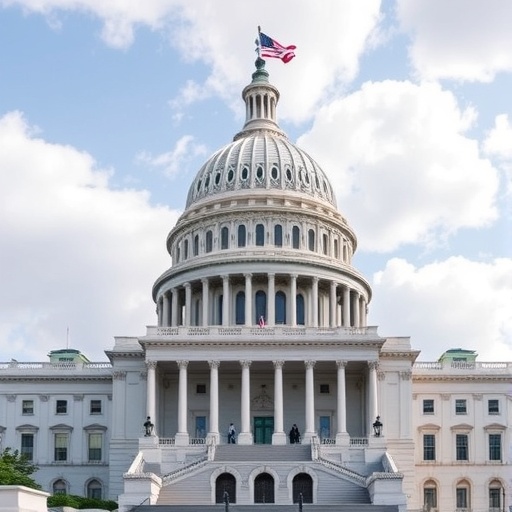New York Senators’ Key Votes in Congress This Week: From Funding Battles to Foreign Aid Decisions
In a whirlwind week of congressional maneuvering ending October 24, New York’s Democratic senators, Chuck Schumer and Kirsten Gillibrand, cast votes that highlighted the intricate dance of politics in a divided Congress. As the nation teetered on the brink of a government shutdown, Schumer, the Senate Majority Leader, played a pivotal role in averting disaster with a last-minute continuing resolution. Meanwhile, Gillibrand’s steadfast support for foreign aid packages underscored New York’s progressive leanings amid global tensions. These votes on critical legislation not only shaped immediate policy outcomes but also signaled deeper fault lines in national politics, affecting everything from federal budgets to international alliances.
The week’s proceedings were marked by intense partisan debates, with Republicans pushing for spending cuts and Democrats defending social programs. Schumer’s leadership was on full display, as he navigated a razor-thin majority to pass key measures. Gillibrand, known for her focus on women’s rights and veterans’ issues, aligned closely with her party but occasionally voiced nuanced positions. According to a recent Gallup poll, 62% of New York voters prioritize fiscal responsibility in federal spending, making these votes particularly resonant for the state’s 19 million residents.
Schumer’s Decisive Push Averts Government Shutdown
At the heart of the week’s drama was the battle over federal funding, culminating in a continuing resolution (CR) that kept government operations running through mid-November. On October 20, the Senate voted 77-19 to pass the measure, with Schumer voting yes and leading negotiations to include disaster relief for hurricane-hit regions like New York and New Jersey. This vote came after days of brinkmanship, where House Republicans demanded deeper cuts to non-defense spending.
Schumer, representing New York’s diverse urban and suburban districts, emphasized the human cost of inaction. In a floor speech, he declared, “We cannot let political gamesmanship endanger the livelihoods of millions. This CR protects Social Security payments, veterans’ benefits, and essential services for New York families.” The legislation allocated $12.5 billion for Federal Emergency Management Agency (FEMA) operations, crucial for ongoing recovery from storms Ida and recent floods in upstate New York.
Historically, Schumer has been instrumental in similar high-stakes funding battles. During the 2018-2019 shutdown, he brokered deals that preserved funding for the Children’s Health Insurance Program (CHIP), which serves over 100,000 New York children annually. This week’s success bolstered his image as a pragmatic leader, but critics from the progressive wing, like Rep. Alexandria Ocasio-Cortez, argued it didn’t go far enough in addressing climate resilience funding. Data from the Congressional Budget Office shows that without the CR, federal employees in New York—numbering over 150,000—faced furloughs, potentially costing the state $1.2 billion in economic activity.
Gillibrand also voted yes on the CR, aligning with Schumer to ensure continuity. However, she used the debate to advocate for amendments protecting agricultural subsidies, vital for New York’s $5.4 billion dairy industry. Her office reported that the bill includes extensions for farm aid programs, preventing price volatility for farmers in the Finger Lakes region.
Gillibrand Champions Foreign Aid Amid Israel-Hamas Conflict
Shifting gears to international affairs, the Senate on October 19 approved a $14.3 billion supplemental aid package for Israel by a vote of 78-11, with both New York senators voting in favor. This legislation, part of a broader $105 billion foreign aid bill that also supports Ukraine and Taiwan, came in response to the escalating Israel-Hamas war following the October 7 attacks. Gillibrand, who has deep ties to New York’s Jewish community—estimated at 1.7 million strong—hailed the package as “a lifeline for our ally in a time of existential threat.”
The aid includes $3.8 billion for Israel’s Iron Dome missile defense system, which has intercepted thousands of rockets since the conflict’s onset. Schumer, whose district includes significant pro-Israel advocacy groups, echoed this sentiment, stating, “Supporting Israel’s right to defend itself is non-negotiable, but we must also push for humanitarian corridors in Gaza.” His vote was part of a bipartisan effort, though 11 progressive Democrats, including Sen. Bernie Sanders, opposed it over concerns about unrestricted military funding.
For New York, the implications are profound. The state hosts major defense contractors like Lockheed Martin, which could see contracts from the aid package. Moreover, anti-Semitism incidents surged 360% nationwide post-October 7, per the Anti-Defamation League, prompting Gillibrand to co-sponsor related hate crime legislation. In context, this vote builds on Gillibrand’s record; she previously led efforts for the 2022 Ukraine aid bill, which funneled $40 billion to Eastern Europe, benefiting New York’s tech sector through cybersecurity collaborations.
Experts like Dr. Emily Rosenberg from the Council on Foreign Relations note, “Gillibrand’s consistent support for aid reflects New York’s global outlook, but it risks alienating younger voters who favor diplomatic solutions.” Polling from Siena College shows 54% of New Yorkers back Israel aid, but with caveats for Palestinian relief, highlighting the nuanced politics at play.
Split on Immigration Reform Exposes Party Tensions
Immigration emerged as a flashpoint, with the Senate debating the bipartisan Border Act on October 23, which failed 51-48 after procedural hurdles—both Schumer and Gillibrand voted yes, but it lacked the 60 votes needed to overcome a filibuster. The bill aimed to allocate $20 billion for border security, including 1,500 new agents and asylum processing reforms, amid record migrant encounters exceeding 2.4 million in fiscal year 2023.
Schumer, navigating his role as majority leader, framed the vote as a compromise: “This isn’t about open borders or walls; it’s about smart, humane management.” For New York, a sanctuary state with 500,000 undocumented immigrants contributing $25 billion to the economy per the Fiscal Policy Institute, the failure stings. Cities like New York have spent $1 billion on migrant housing since spring 2023, straining budgets.
Gillibrand, a longtime advocate for Dreamers, pushed for DACA protections in the bill. She remarked, “New York’s strength is its diversity; we can’t turn our back on families fleeing violence.” Her vote aligns with past efforts, such as the 2013 Gang of Eight bill, which she supported for comprehensive reform. However, Republican opposition, led by Sen. Ted Cruz, derailed it, accusing Democrats of election-year pandering.
The defeat underscores broader Congressional dysfunction. According to the Migration Policy Institute, without reform, New York’s social services face overload, with shelters at 95% capacity. Progressive groups like Make the Road New York praised the senators‘ yes votes but urged bolder action, such as citizenship pathways, in future legislation.
United Front on Veterans’ Healthcare Expansion
In a rare moment of unity, Schumer and Gillibrand both voted yes on October 22 for the PACT Act expansion, passing 88-9, which extends toxic exposure benefits to over 3.5 million veterans. This legislation builds on the 2022 Honoring Our PACT Act, adding $18 billion for VA healthcare, including mental health services critical for New York’s 700,000 veterans.
Gillibrand, chair of the Senate Armed Services Subcommittee on Personnel, was a lead sponsor. “Our veterans from Iraq, Afghanistan, and now Ukraine support deserve comprehensive care,” she said. The bill covers burn pit exposures linked to cancers, affecting 10,000 New York vets per VA estimates. Schumer co-authored amendments for rural access, benefiting upstate areas like Buffalo.
This vote reflects the senators‘ bipartisan streaks; Schumer previously secured $2 billion for VA facilities in New York via the 2021 infrastructure law. With suicide rates among veterans at 17 per day nationally, the expansion could save lives. The American Legion commended the move, noting it addresses a 20% rise in PTSD claims since 2020.
Economically, enhanced VA funding injects $10 billion annually into healthcare jobs in New York, per state labor data. As politics polarizes, this vote shows potential for cross-aisle wins on non-partisan issues.
Looking ahead, these votes position New York’s senators for 2024 battles. Schumer’s funding leadership could shield him from primary challenges, while Gillibrand’s aid stances may galvanize donors. Nationally, the CR buys time for a full budget deal by December, but immigration gridlock persists. With midterms looming, expect intensified debates on legislation affecting everyday Americans. For New Yorkers, the focus shifts to how these decisions translate into local impacts—from disaster aid to border policies—shaping the Empire State’s role in federal politics.








